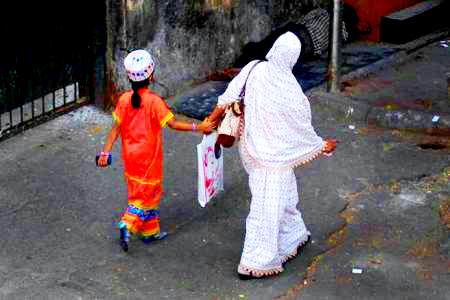By: Anonymous
Age: 30
Country: United States
(Read the Gujarati translation of this article here and the Hindi translation here.)
Khatna is a term and a practice I learned about when I was about 15 years old. I was chatting with a friend over AOL instant messenger and she asked me if I had ever had Khatna done to me. At the time, I was completely unaware of the practice or that it was performed on young girls within the Bohri community, to which I belonged. I was unsure of how to respond to my friend. Like other practices performed on children at the time of their birth, such as a Chhatti which is a naming ceremony for the baby or an Aqiqah which is the sacrificing of a goat on the occasion of a child’s birth, I assumed that Khatna was probably also done to me but I was just too young to remember.
I immediately asked my mother about Khatna and if she ever had it done to me. She responded “No beti, I did not have it done to you.” And in a more hushed and slightly worried voice, she went on to say, “But do not ever tell anyone.” I probed further, asking what it was exactly. My mother was unable to completely explain what it was or why it was done. All she was able to say was that girls are cut within their “private parts”. She went on to say that yes, she had undergone it herself at the age of seven, but that she could not subject her daughters to it because of the physical and emotional pain it had caused her at the time of the cutting and the pain that it has caused her since then.
At the time, I did not realize the significance of my mother choosing not to have the practice performed on me and my sisters or furthermore, why she explicitly asked me not to say anything to anyone, especially within the community.
A few years after my initial inquiry about Khatna, I was at an all-women meeting at my local mosque. Someone asked the wife of our priest, known as a Behnsaab, about Khatna. The Behnsaab responded that it was done to enhance sexual pleasure in women and that it is required for all women within the community. Having heard conflicting information from my mother years earlier, the Behnsaab’s comments confused me. However, the fact that the Behnsaab stated that the practice was required helped me to understand why my mother asked me not to talk to anyone about my lack of Khatna. My mother feared the backlash she or her family might face for going against the word of the community and therefore, she kept her bold choice a secret.
Today, as a grown adult, having learned about the physical and emotional harm it causes, I realize and appreciate what my mother did for me and my sisters. I cannot begin to understand what women who have undergone Khatna must face in their day to day lives. It continues to shock me that this practice still goes on (though it is more underground) and apart from “tradition” most people have no legitimate medical reason for why Khatna is still part of the community’s practices or really even know why it is practiced. I hope that as more and more people become aware of the practice and its harms, efforts from within the community become stronger to stop this harmful practice of violating young girls for the sake of tradition.

